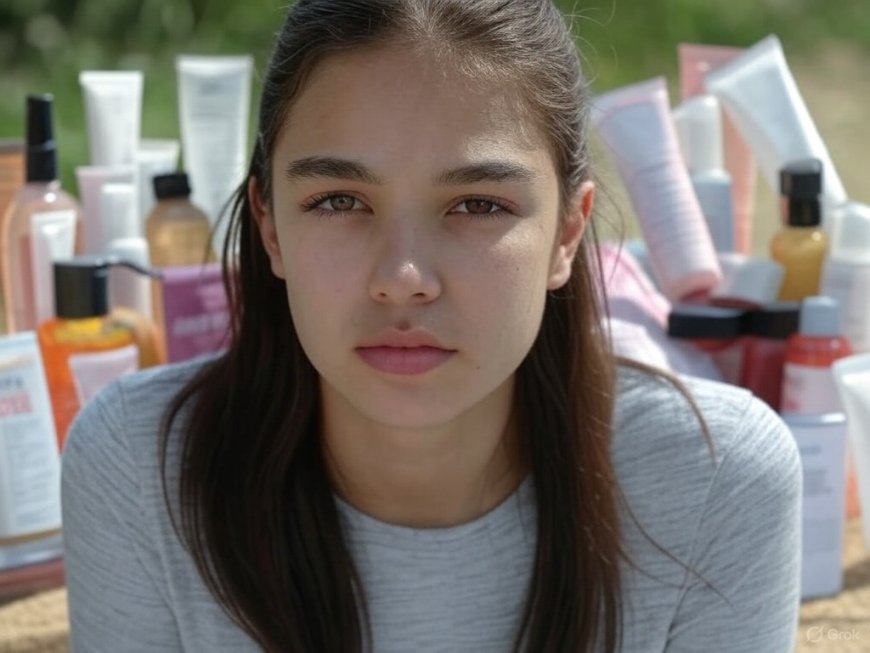Skin Fasting: Should You Take a Break from Skincare Products?
Is skin fasting the secret to healthier skin, or is it a skincare myth? Discover what dermatologists say about taking a break from skincare products.

The beauty industry bombards us with a never-ending stream of serums, exfoliants, and anti-aging treatments, promising flawless skin. But what if the secret to a healthier complexion isn’t adding more products—but using fewer? Enter skin fasting, a minimalist skincare trend that encourages people to give their skin a break.
But does skin fasting actually improve skin health, or is it just another viral fad? Let’s explore what dermatologists and skincare experts have to say.
What Is Skin Fasting?
Skin fasting is the practice of reducing or completely stopping the use of skincare products for a certain period to allow the skin to reset. The concept is based on the belief that the skin can regulate itself, and eliminating products might help restore its natural balance.
The idea was first popularized by Japanese skincare brand Mirai Clinical, which suggested that modern skincare routines might be overloading the skin, weakening its natural barrier, and disrupting its ability to function on its own.
Types of Skin Fasting
-
Complete Skin Fasting: Avoiding all skincare products, including cleansers, moisturizers, and serums.
-
Partial Skin Fasting: Eliminating only certain products, such as exfoliants, retinoids, or heavy moisturizers.
-
Intermittent Skin Fasting: Taking occasional breaks, such as skipping skincare one night a week or reducing product use on weekends.
Further Reading: How Overusing Skincare Can Damage Your Skin Barrier
The Science Behind Skin Fasting
Supporters of skin fasting argue that the skin has a natural renewal process, and excessive skincare can interfere with it. The skin produces sebum (natural oil), ceramides, and microbiota that help keep it hydrated and protected. Some believe that stopping skincare allows the skin to self-regulate, reducing sensitivity and breakouts.
However, dermatologists have mixed opinions.
Potential Benefits of Skin Fasting
1. May Strengthen the Skin Barrier
Overusing actives like retinoids and acids can compromise the skin’s protective barrier, leading to irritation, redness, and increased sensitivity. Taking a break might allow the skin to repair itself naturally.
2. Can Reduce Product Dependence
Some people rely too heavily on skincare products instead of addressing diet, hydration, and sleep, which also affect skin health. A break from skincare can shift the focus to internal well-being.
3. Helps Identify Irritating Ingredients
If your skin is constantly inflamed, skin fasting can help pinpoint whether a particular ingredient or product is causing the issue.
4. May Balance Sebum Production
Some experts believe that excessive washing and moisturizing disrupts natural oil production, causing either excessive dryness or oily skin. Skin fasting could encourage the skin to find its natural balance.
Further Reading: How the Skin Microbiome Affects Skin Health
The Risks of Skin Fasting
1. Skin May Become Dehydrated
Skipping moisturizer, especially for dry or sensitive skin types, can lead to flaking, tightness, and irritation.
2. No UV Protection
If skin fasting includes skipping sunscreen, it can increase sun damage, premature aging, and skin cancer risk.
3. May Worsen Skin Conditions
For those with acne, eczema, or rosacea, stopping a prescribed skincare regimen could trigger flare-ups. Dermatologists do not recommend skin fasting for people with existing skin conditions.
4. The Skin Doesn’t “Detox”
The idea that skin fasting allows the skin to "detox" is a myth. The liver and kidneys detox the body, not the skin.
Further Reading: Why Your Skin Doesn’t Need to Detox
Is Skin Fasting Right for You?
Who May Benefit from Skin Fasting?
-
People with mild skin irritation or over-exfoliation.
-
Those using too many products and experiencing breakouts or congestion.
-
Anyone looking to simplify their skincare routine.
Who Should Avoid It?
-
Those with acne, eczema, or rosacea, as stopping treatment can worsen symptoms.
-
People with dry skin who need regular moisturization.
-
Anyone skipping sunscreen, as UV exposure causes long-term damage.
How to Try Skin Fasting Safely
1. Start with a Partial Fast
Instead of stopping all products, try removing just one or two (like exfoliants or heavy creams) and observe how your skin reacts.
2. Always Use Sunscreen
Never skip SPF, even if you’re fasting from other skincare products. Sunscreen is non-negotiable for healthy skin.
3. Stay Hydrated and Eat Well
Focus on hydrating from within and eating skin-friendly foods rich in omega-3s, antioxidants, and vitamins.
4. Listen to Your Skin
If your skin feels excessively dry, tight, or irritated, reintroduce a gentle cleanser and lightweight moisturizer.
Further Reading: How Diet Affects Skin Health
Final Verdict: Should You Try Skin Fasting?
Skin fasting is a controversial trend, with both benefits and drawbacks. While it may help reset your skin and simplify your routine, it’s not a one-size-fits-all solution.
For those with resilient or combination skin, reducing product use occasionally might improve overall skin health. However, for individuals with dry, sensitive, or acne-prone skin, stopping skincare abruptly can cause more harm than good.
Instead of completely cutting out skincare, a balanced approach—such as using fewer, high-quality products—may be the best way to support healthy skin without overloading it.
Related Reads & Sources
What's Your Reaction?
 Like
0
Like
0
 Dislike
0
Dislike
0
 Love
0
Love
0
 Funny
0
Funny
0
 Angry
0
Angry
0
 Sad
0
Sad
0
 Wow
0
Wow
0



















































